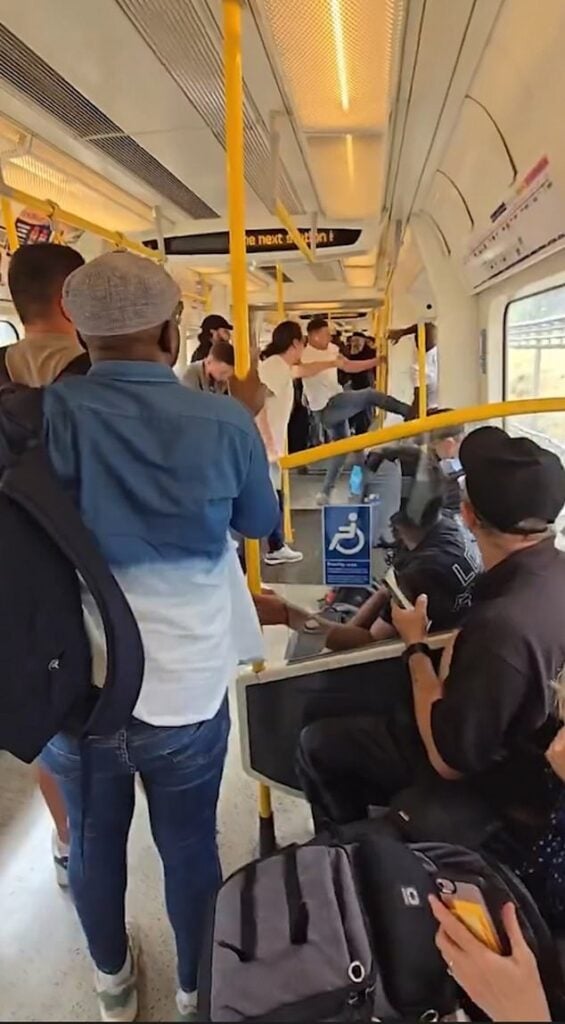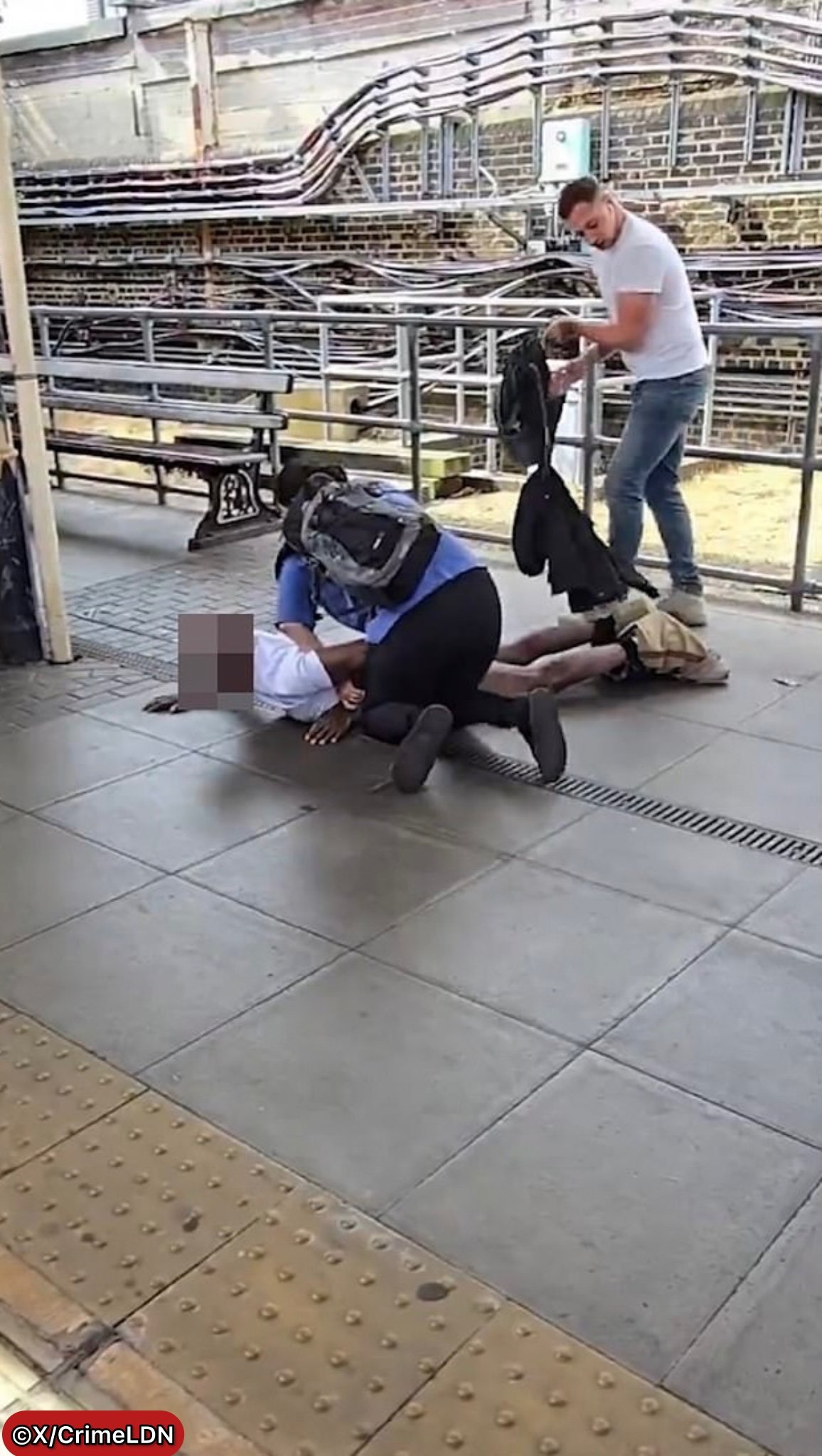Commuters who forcibly removed a half-naked man from a packed District line train in east London could face criminal charges after British Transport Police confirmed the man had been assaulted and was subsequently detained under the Mental Health Act.
The incident, which occurred at approximately 3.30pm last Thursday between Upton Park and East Ham stations, has sparked a police investigation after video footage showed up to four men kicking and punching the disturbed passenger who had dropped his trousers in the crowded carriage.
British Transport Police have now appealed for witnesses to come forward as detectives investigate whether the vigilantes committed criminal offences during the confrontation. The naked man, who was pinned to the floor and physically carried off the train, is currently receiving treatment in hospital after being sectioned.
Mental Health Crisis Escalates to Violence
According to eyewitnesses, the man began yelling after the eastbound train travelled between Upton Park and East Ham stations before dropping his trousers and placing his belt around his neck. His bottom and genitals were exposed in the packed carriage, which contained children on their summer holidays.
Video footage circulating online shows a passenger initially approaching the man, politely but firmly telling him: “You need to get off the train. When the disturbed man responded by repeatedly shouting “f*** off”, the confrontation quickly escalated.
“What do you mean f*** off. You need to get off the f***ing train. Now. There are kids on here”, one commuter was heard saying in response to the man’s profanity-laden outbursts.
The situation then spiralled out of control as a group of men physically confronted the naked passenger. Footage showed them kicking and punching him whilst he attempted to hit them with his belt. The vigilantes eventually overpowered him, snatching away his belt and pinning him to the carriage floor with his arm behind his back, still with his trousers around his ankles.

Forcible Removal Sparks Investigation
Passengers were heard shouting “We’ve got to get him off” before the group unceremoniously carried the man onto the platform at East Ham station and dumped him on the floor. He was pinned down as commuters attempted to alert station staff.
An off-duty police officer who was on the train then performed an arrest before the man was taken to hospital. A BTP spokesperson confirmed: “Officers were called to reports of a man exposing himself on the District Line at East Ham Underground station at around 3.30pm yesterday (Thursday, August 7)”.
The statement added: “The man had been assaulted by a number of other passengers and was initially arrested by an off duty officer, before being detained under the mental health act and taken to hospital. An investigation into the incident is ongoing”.
The fact that police are now investigating the passengers’ actions highlights the complex legal issues surrounding citizen interventions, particularly when dealing with individuals experiencing mental health crises.
Rising Crime on London Transport
The shocking incident comes amid soaring crime rates on London’s transport network, with the latest figures showing total offences on the Tube rising by more than 50 per cent in a single year. Crime on Transport for London services, including buses and the London Overground, increased by 30 per cent, from 17,160 offences to 22,294.
The crime rate per million passenger journeys on the Underground now stands at 18.6, up from 13.7 the previous year. Thefts on the Underground surged by 83 per cent whilst robberies doubled, even as passenger numbers fell by 11 per cent.
Since Sadiq Khan became Mayor in 2016, overall crime in London has increased significantly. Violent crime has risen by 30 per cent from 190,000 incidents in 2016 to 250,000 in the most recent figures. Knife crime has shown particularly alarming increases, rising every year except during the 2020 Covid lockdowns.
Mental Health on Public Transport
British Transport Police deal with approximately 17,000 mental health related incidents annually, of which 4,427 involve suicidal activity. The force has specialist Suicide Prevention and Mental Health teams working alongside NHS mental health professionals to respond to people in crisis on the network.
The incident highlights the challenges faced by both passengers and transport staff when confronted with individuals experiencing mental health episodes in confined public spaces. BTP guidance emphasises de-escalation and professional intervention rather than physical confrontation.
Mental health incidents represent a significant demand on BTP resources. For every robbery offence on the rail network, there are 39 mental health related incidents. The force prevents approximately 1.7 people per day from attempting suicide on the GB rail network.
Legal Implications for Vigilantes
Criminal law experts warn that members of the public who take the law into their own hands risk prosecution, even when attempting to address anti-social or criminal behaviour. While citizens have certain powers to prevent crime or make arrests, the use of force must be reasonable and proportionate to the threat posed.
The fact that the man was subsequently detained under the Mental Health Act rather than charged with any criminal offence could complicate matters for those who assaulted him. Mental health advocates have expressed concern about the violent response to someone clearly in distress.
Khan Under Fire Over Crime Record
The incident has reignited criticism of Mayor Sadiq Khan’s record on crime and public safety. Conservative politicians have accused him of presiding over a “crime epidemic” in the capital, with some claiming crime has risen “five times faster” than the rest of the country since 2016 – though this claim was debunked by fact-checkers who found crime had actually increased less in London than across England overall.
Khan, who was knighted in the 2025 New Year Honours for political and public service, has blamed budget cuts by previous Conservative governments for limiting police resources. He has pointed to his investment of £1.16 billion in policing and claims that homicides, gun crime, and knife crime with injury have decreased since 2016.
However, critics point to the 71 per cent surge in the mayoral precept – the portion of council tax that funds London-wide services – during Khan’s tenure, from £276 per household in 2016 to £471 in the current financial year.
Community Response and Safety Concerns
The incident has sparked intense debate on social media about public safety, mental health provision, and appropriate responses to anti-social behaviour on public transport. Many commuters expressed sympathy for families with children who witnessed the disturbing scene, whilst others criticised the violent response to someone clearly experiencing a mental health crisis.
Transport for London has emphasised that millions of journeys are made safely on its network every day. The organisation works closely with BTP and maintains an extensive CCTV network alongside thousands of frontline staff to ensure passenger safety.
As the investigation continues, the incident serves as a stark reminder of the complex challenges facing London’s transport network, from rising crime rates to inadequate mental health support. For the commuters involved, what began as an attempt to protect fellow passengers could result in criminal charges – highlighting the risks of vigilante action, regardless of intentions.
British Transport Police continue to appeal for witnesses to contact them as they investigate both the initial incident and the subsequent assault. The case underscores the need for better mental health crisis intervention on public transport and clearer guidance for passengers on how to respond to disturbing incidents without resorting to violence.
Follow for more updates on Britannia Daily



